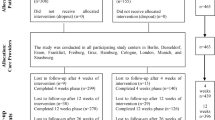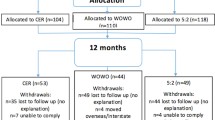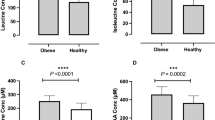Abstract
OBJECTIVE: The beneficial effects of weight loss with a very-low-calorie diet (VLCD) on cardiovascular risk factors have been reported at the end of energy restriction. As the effects, especially on blood pressure, may not remain constant during weight maintenance, we studied the longer-term effects of weight loss on 24 h ambulatory blood pressure (ABP), lipids, glucose and insulin.
DESIGN: Prospective study of a 17-week weight loss programme containing an eight-week VLCD period and follow-up visit at one-year.
SUBJECTS: Twenty-nine moderately obese, normotensive or mildly hypertensive women. The mean±s.d. body mass index (BMI) was 36.0±2.6 kg/m2 and mean age 40.3±8.3 y.
RESULTS: In the last week of the VLCD, the mean (±s.d.) weight loss was 12.4±3.3 kg (P<0.001), at the end of the programme 15.1±4.4 kg (P<0.001 vs baseline), and at one-year follow-up 10.7±7.6 kg (P<0.001 vs baseline). Mean 24 h ABP decreased 8.0/4.6 mmHg (P<0.001 for both) on the last week of the VLCD, at the end of the programme, the systolic ABP decrease was 4.7 mmHg (P<0.01 vs baseline) and diastolic 2.1 mmHg (not statistically significant (NS) vs baseline). At one-year follow-up, the mean systolic ABP decrease was 4.1 mmHg (P<0.01 vs baseline) and mean diastolic 3.0 mmHg (P<0.05 vs baseline). Sodium excretion decreased 55 mmol/24 h in the last VLCD week (P<0.01) and returned to baseline after that. At the one-year follow-up, beneficial changes, compared with baseline, were observed in mean serum glucose (−0.28 mmol/l, P<0.05), triglyceride (−0.35 mmol/l, P<0.01) and HDL cholesterol (+0.16 mmol/l, P<0.001).
CONCLUSIONS: This weight loss programme with a VLCD enabled obese subjects to lose weight and decrease cardiovascular risks. Despite some regain in weight during follow-up, the beneficial effects were overall maintained over the year. Sodium intake tended to increase during follow-up. Information on sodium restriction should be included in weight loss programmes.
This is a preview of subscription content, access via your institution
Access options
Subscribe to this journal
Receive 12 print issues and online access
$259.00 per year
only $21.58 per issue
Buy this article
- Purchase on Springer Link
- Instant access to full article PDF
Prices may be subject to local taxes which are calculated during checkout
Similar content being viewed by others
Author information
Authors and Affiliations
Rights and permissions
About this article
Cite this article
Pekkarinen, T., Takala, I. & Mustajoki, P. Weight loss with very-low-calorie diet and cardiovascular risk factors in moderately obese women: One-year follow-up study including ambulatory blood pressure monitoring. Int J Obes 22, 661–666 (1998). https://doi.org/10.1038/sj.ijo.0800644
Received:
Revised:
Accepted:
Published:
Issue Date:
DOI: https://doi.org/10.1038/sj.ijo.0800644
Keywords
This article is cited by
-
The Longer-Term Effects of Roux-en-Y Gastric Bypass Surgery on Sodium Excretion
Obesity Surgery (2013)
-
Ambulatory blood pressure monitoring in childhood and adult obesity
Current Hypertension Reports (2009)
-
Desaturation of Skeletal Muscle Structural and Depot Lipids in Obese Individuals during a Very‐Low‐Calorie Diet Intervention
Obesity (2007)
-
Structured weight-loss programs: Meta-analysis of weight loss at 24 weeks and assessment of effects of intervention intensity
Advances in Therapy (2004)
-
Metabolic Characteristics and Body Composition in a Model of Anti‐Obese Rats (Lou/C)
Obesity Research (2002)



